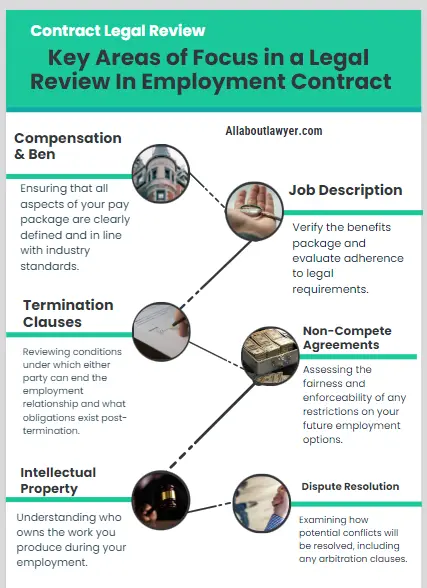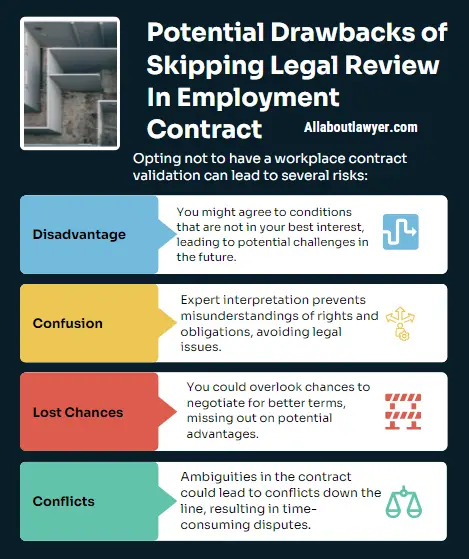Should I Need To Have a Lawyer To Review My Employment Contract?
In today’s complex professional landscape, the significance of a well-crafted and thoroughly understood employment contract cannot be overstated. As you start on a new career opportunity or consider a job offer, the question often arises: Should I need to have a lawyer to review my employment contract? This Article aims to explore the various aspects of this crucial decision, providing you with the insights needed to make an informed choice.
Table of Contents
Understanding the Employment Contract
Before delving into the necessity of legal consultation for job agreements, it’s essential to grasp what an employment contract entails. This document serves as the foundation of your professional relationship with your employer, outlining the terms and conditions of your employment. It typically covers aspects such as:
1. Job responsibilities and expectations
2. Compensation and benefits
3. Work hours and location
4. Vacation and leave policies
5. Confidentiality and non-compete clauses
6. Termination conditions
Given the wide-ranging implications of these terms, a thorough employment terms evaluation becomes crucial to ensure your interests are protected.
The Case for Legal Review To Employment Lawyer
There are several compelling reasons to consider a work contract legal review:
1. Expertise in Labor Law:
Employment law is a complex and ever-evolving field. An attorney specializing in this area can provide insights that you might otherwise miss.
2. Identifying Potential Issues:
A legal professional can spot problematic clauses or vague language that could potentially lead to disputes in the future.
3. Negotiation Support:
If there are terms you wish to negotiate, a lawyer can advise you on what’s reasonable to ask for and how to approach the conversation.
4. Understanding Your Rights:
An occupational terms assessment can help you fully understand your rights and obligations under the contract.
5. Protection Against Unfair Terms:
Some employers may include clauses that unfairly restrict your future career options or impose unreasonable obligations.
6. Ensuring Compliance:
A labor law compliance check can ensure that the contract adheres to all relevant local, state, and federal laws.
Key Areas of Focus in a Legal Review In Employment Contract
When conducting a job offer document examination, a lawyer will typically focus on several key areas:

1. Compensation and Benefits: Ensuring that all aspects of your pay package are clearly defined and in line with industry standards.
2. Job Description and Responsibilities: Checking that your role is clearly outlined to prevent potential disputes over job duties.
3. Termination Clauses: Reviewing conditions under which either party can end the employment relationship and what obligations exist post-termination.
4. Non-Compete and Non-Solicitation Agreements: Assessing the fairness and enforceability of any restrictions on your future employment options.
5. Intellectual Property Rights: Understanding who owns the work you produce during your employment.
6. Dispute Resolution Mechanisms: Examining how potential conflicts will be resolved, including any arbitration clauses.
7. Changes to Employment Terms: Looking at how and when the employer can modify the terms of your employment.
The Process of Legal Review Of Employment Contract
The career agreement legal check process typically involves several steps:
1. Initial Consultation: You’ll discuss your concerns and objectives with the attorney.
2. Document Review: The lawyer will carefully read through the entire contract.
3. Analysis: They’ll identify any problematic clauses or areas that need clarification.
4. Explanation: The attorney will explain their findings in terms you can understand.
5. Recommendations: They’ll suggest changes or negotiation points based on their analysis.
6. Support in Negotiations: If needed, the lawyer can assist in communicating with the employer to address concerns.
Potential Outcomes of Legal Review Of Employment Contract
A professional terms legal analysis can lead to several outcomes:
1. Peace of Mind: You may find that the contract is fair and favorable, giving you confidence to proceed.
2. Negotiation Points: The review might reveal areas where you can negotiate for better terms.
3. Red Flags: In some cases, the review might uncover issues serious enough to reconsider the job offer.
4. Clarity: Even if no changes are needed, you’ll gain a clearer understanding of your rights and obligations.
When Legal Review is Particularly Important
While it’s generally beneficial to have any employment contract reviewed, there are situations where it becomes particularly crucial:
1. Executive-Level Positions: These often involve complex compensation packages and significant responsibilities.
2. Highly Specialized Roles: Unique positions may require carefully tailored contract terms.
3. Startups or Rapidly Growing Companies: These environments can present unique challenges and opportunities that should be carefully considered.
4. International Employment: Working across borders introduces additional legal complexities.
5. Significant Career Transitions: Major career moves often warrant extra scrutiny of the new employment terms.
Potential Drawbacks of Skipping Legal Review In Employment Contract
Opting not to have a workplace contract validation can lead to several risks:
1. Unfavorable Terms: You might agree to conditions that are not in your best interest.
2. Misunderstandings: Without expert interpretation, you might misunderstand your rights and obligations.
3. Missed Opportunities: You could overlook chances to negotiate for better terms.
4. Future Disputes: Ambiguities in the contract could lead to conflicts down the line.
5. Career Limitations: Overly restrictive clauses might hamper your future job prospects.

Cost Considerations
While the employee rights protection offered by legal review is valuable, it’s important to consider the cost. Fees for reviewing an employment contract can vary widely based on the lawyer’s experience, the complexity of the contract, and your location. However, many professionals view this expense as an investment in their career security.
Some options to manage costs include:
1. Flat Fee Services: Some lawyers offer fixed-price contract review services.
2. Limited Scope Review: You might opt for a review focused only on specific areas of concern.
3. Legal Insurance: Some insurance plans cover employment contract reviews.
4. Pro Bono Services: In some cases, you might find free or low-cost legal services through professional associations or legal aid organizations.
DIY Contract Review: Is it an Option?
While having a professional conduct a contractual obligation review is ideal, some individuals might consider reviewing the contract themselves. If you choose this route:
1. Research common employment contract terms and their implications.
2. Pay close attention to any industry-specific clauses.
3. Look for vague language or terms you don’t fully understand.
4. Compare the offered terms with industry standards.
5. Don’t hesitate to ask the employer for clarification on any points.
Remember, however, that this approach carries risks, as you may miss nuances that a legal professional would catch.
Conclusion
In the grand scheme of your career, the decision to Should I have needed to have a lawyer to review my employment contract is a relatively small step that can have significant long-term impacts. While it involves an upfront investment of time and potentially money, the benefits of a thorough legal safeguard assessment often far outweigh the costs.
By ensuring you fully understand and agree with the terms of your employment, you’re setting the stage for a clearer, more secure professional relationship. This can lead to greater job satisfaction, reduced risk of disputes, and better protection of your rights and interests throughout your career journey.
Ultimately, the decision to seek legal review depends on your individual circumstances, the complexity of the contract, and your comfort level with legal documents. However, for many professionals, it’s an invaluable step in starting a new job on the right foot, armed with full knowledge and confidence in their employment agreement.
FAQs
Q: How much does it typically cost to have a lawyer review an employment contract?
A: The cost can vary widely depending on the lawyer’s experience, the contract’s complexity, and your location. Prices can range from a few hundred to several thousand dollars. Some lawyers offer flat-fee services for straightforward contract reviews.
Q: How long does an employment contract review usually take?
A: A typical review can take anywhere from a few hours to a few days, depending on the contract’s complexity and the lawyer’s schedule. Rush reviews may be possible but often come with additional fees.
Q: Can I negotiate my employment contract after I’ve already signed it?
A: While it’s possible to renegotiate terms after signing, it’s much more challenging. It’s always best to review and negotiate before signing. Any changes after signing would require mutual agreement and potentially a new contract.
Q: What are some red flags I should look for in an employment contract?
A: Common red flags include overly broad non-compete clauses, vague job descriptions, unclear compensation structures, and provisions that allow the employer to change terms unilaterally. Also, be wary of any clauses that seem to waive your legal rights.
Q: Is it worth getting a lawyer to review a contract for a short-term or entry-level position?
A: While it’s especially crucial for long-term or high-level positions, even entry-level contracts can contain important clauses that affect your rights. If budget is a concern, consider a limited scope review focusing on key areas like non-compete clauses and termination conditions.
For more such informative article fee free to visit All About Lawyer Website.
About the Author

Sarah Klein, JD, is a former employment attorney who has advised clients on wrongful termination, workplace discrimination, wage disputes, and employee rights. At All About Lawyer, she writes practical, legally sound guides to help workers understand labor laws and stand up for fair treatment at work.
Read more about Sarah
